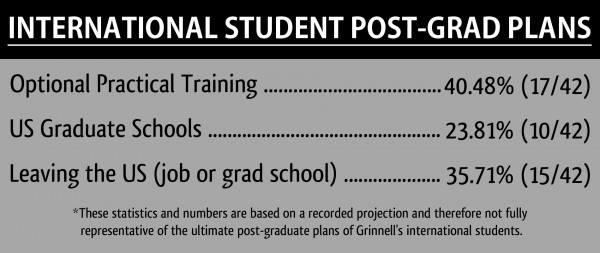By Lisa Oyolu
oyolulis17@grinnell.edu
One of the unique qualities that distinguishes Grinnell College is the diversity of its student body. Karen Edwards, Associate Dean and Director of the Office of International Student Affairs (OISA) emphasizes the importance of having a student body with a wide range of backgrounds and global histories that can be shared with their fellow students, thus further enriching the Grinnell experience.
Though students may identify themselves as ‘international’ for reasons such as international residences or dual-citizenship, Edwards primarily views ‘international students’ as those who came to the United States as F-1 visa holders. With a F-1 visa, students are not necessarily set to achieve legal status as a permanent resident or citizen.
In order to provide assistance to international students regarding their specific post-grad needs, the OISA and Center for Careers, Life, and Service (CLS) have collaborated to set up meetings with international students, largely via individual sessions. There is also a mandatory meeting with all international seniors towards the end of the fall semester of their senior year to discuss potential options following graduation. However, in determining their post-graduate plans, international students may have to face obstacles in pursuing opportunities within the United States, being non-U.S. citizens, as well as even in their home countries, having gone to school in the U.S.
“It’s just harder for international students,” said Doug Cutchins ’93, Assistant Dean and Director of Post-Graduate Transitions. “[There] are societal, cultural, and legal barriers.”
These barriers may include difficulty financing graduate education or the reluctance of employers to consider foreign nationals if they would need sponsorship from the company. And in some cases, opportunities these students may find will still be temporary.
“For people who come to the United States on a student visa, the United States government gives them the ability to work for a year [immediately] after graduation within the United States in a field that is directly related to their major, but it is optional,” Cutchins explained. “They do not have to do this, as the name [Optional Practical Training—OPT] implies.”
Chike Abuah ’14, a Computer Science major, is one of the students who will be doing the OPT by working as a software engineer for a recently established company in New York City. His work will deal primarily with predictive data analytics for marketing companies. Using web listings to search for jobs, Abuah managed to navigate the fairly unclear application process for software engineer openings.
“You need to have an online portfolio of projects you’ve participated in and codes you’ve written and projects you contributed to. You need to have an online presence even on social networks like Twitter or Facebook or Google +,” Abuah said of his job search experience.
Many international students who choose not to utilize OPT pursue opportunities in their home countries. Thu Htet ’14, an Economics major and Global Development Studies concentrator, is one of them. Htet plans to work in Myanmar as a business development associate for Yoma Strategic Holdings Limited. He feels that his liberal arts education has thoroughly prepared him for this position, especially in giving him a wider lens to go about solving problems related to his home country.
After seeing the political situation in Myanmar improve, Htet decided early on that he wanted to return to Myanmar, and he tailored his Grinnell education to suit these plans.
“I chose [my] classes based on what I can do if I go back home. I majored in Econ and I did global development studies, because it’s very related to my country,” he said. “A lot of substantive changes are taking place, and I think there are a lot of problems [in Myanmar], but I think that the advantages outweigh these drawbacks.”
However, not all international decide to stay in the U.S. or return to their home country. Such is the case for David Reda ’14, who is from the Czech Republic.
Reda will be working in one of Vietnam’s large language academies. He plans to teach students various aspects of the college admissions process, including test preparation for the SAT and the Test of English as a Foreign Language (TOEFL), as well as helping with admissions essays. However, Reda did not always envision that his life after Grinnell would lead him to Vietnam.
“If you told me a year ago or two years ago that I’d be going to Vietnam, I’d [say] you’re crazy,” Reda shared.
Many of these students did not initially know that where their post-grad plans would take then—back home or in the U.S. or somewhere completely new altogether. But it was through networking and sharing that they came to their current plans.
However, as Cutchins explained, “International students can face barriers in terms of searching for jobs at home, if they decide that they want to go back to their home country, in terms of distance and finding opportunities.”
Therefore, to combat this, PioneerLink includes an extensive list of international work opportunities under the section titled “Going Global.”
International students face a unique set of challenges as they contemplate post-graduation opportunities. However, Grinnell has provided them with specific resources to guide them through an already challenging and confusing process.
“I think really important advice for international students is to plan ahead and to entertain these questions [of next steps after graduation] earlier than you think need to,” Edwards advised. “It’s typical that you wouldn’t really think it mattered a whole lot, until you were a senior, but the truth is the path you set from your first year on is influential.”


















































